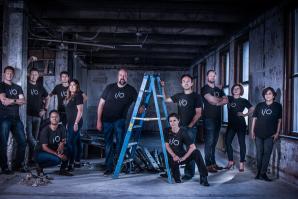Every new job in the local high-tech sector leads to four more jobs created, according to research by the Bay Area Council Economic Institute. That’s because as tech startups turn into profitable businesses, the local economy also grows, boosting industries from retail to real estate. A booming tech-startup scene has done wonders for the Bay Area economy: Can the same thing happen in Sacramento?
Innovation City: Does Sacramento Have What it Takes to be One?
Co-hosted by California Groundbreakers and Comstock’s Magazine
When:
6 p.m. Monday, Jan. 23
Where:
CLARA, 2420 N St., Sacramento
Cost:
Free
Info:
RSVP at California Groundbreakers’ Facebook page
During the last year of his term, former Mayor Kevin Johnson launched big initiatives to make Sacramento “the capital of entrepreneurship.” They included establishing the Mayor’s Office for Innovation and Entrepreneurship and a $10 million Innovation and Growth Fund. The first money from that fund, totaling $970,000, was recently doled out via the MOFIE-managed RAILS program, which awards one-time grants to startups and nonprofits focused on rapid acceleration, innovation and leadership in Sacramento.
Three-Pronged Approach
To build up MOFIE, Johnson tapped Abhi Nemani, a 27-year-old tech wunderkind who helped launch Code for America and served as the City of Los Angeles’ first chief data officer. Nemani, who works on a consulting basis (he lives full-time in St. Louis), started by meeting with Sacramento leaders in tech and higher education, and heard three key themes right away.
“Folks don’t look at Sacramento as an innovation city like San Francisco or Austin, and while there is a lot of innovative stuff going on here, not a lot of people know about it,” Nemani says. Another problem: While Sacramento’s universities produce great talent, graduates aren’t staying. They head to the Bay Area instead because they think that’s where their idea will get off the ground.
To prevent that from happening,the Innovation and Growth Fund focuses on three goals: building a talent pipeline, drawing venture capital and investors to the area, and creating a better-connected tech community. RAILS grants are given to groups that help startups in those areas. “To create a pipeline, it’s about leadership: training and empowering people with tools to be successful,” Nemani says. “Second is innovation: getting people connected, in places like coworking spaces and maker labs. Third is acceleration: creating incubator and accelerator programs to help entrepreneurs with ideas take them to scale.” RAILS grant applicants also had to show that they have a commitment to diversity and inclusion within employee ranks, and a track record for delivering results quickly and on budget.
Related: Impact of New Technologies Measured in Social Value
RAILS’ four-week application process last summer garnered 143 applicants. They were evaluated by MOFIE, representatives from the city’s economic development and information technology departments, and a six-person panel of local tech and business executives. The group narrowed that list down to 15, which the Sacramento City Council unanimously approved in November, awarding a total of $970,000 in grant funding.
To be considered for RAILS, each candidate presented metrics for what they can accomplish in 12 months, and winners must provide monthly updates. MOFIE is building a dashboard to track metrics of recipients’ efforts, like revenue growth and new jobs created, and plans to launch the second round of grants this summer.
And the Winners Are
The three largest grants went to already-established names in Sacramento’s tech industry. Hacker Lab, which has two maker spaces, got $100,000, as did Jack Crawford of Impact Venture Capital for his annual accelerator program, Entrepreneurs Showcase. I/O Labs, run by the founders of the coworking space Urban Hive, is renovating a downtown bank building into an innovation center, got the biggest grant at $250,000 to use for the start-up costs of I/O Foundation, its nonprofit arm. (Its accelerator program, expected to start later this year, will accept up to 20 startups and will be funded by Folsom-based venture capital firm Moneta Ventures).
The other 12 grants, ranging from $10,000 to $57,000, went to projects aimed at training future entrepreneurs, tying Sacramento’s innovation community closer together, and giving groups not typically prevalent in tech (women, youth in disadvantaged neighborhoods) better access to tech education, training and jobs. A few examples:
Acceleration: Founder Academy received $50,000 to run 12-week programs that give Sacramento startups training, mentorship and back-office support. “It’s intended to get employees wanting to start their own businesses into the local ecosystem to find the help they need to move their ideas forward, and to help companies already working on an idea refine and grow it,” says co-founder Duane Wilson.
Core to the academy’s success is connecting good mentors and business sponsors with the startups to build the strong relationships they’ll need in banking, law, marketing and development. Wilson, a semi-retired serial entrepreneur, says he has built a strong mentor network. “While our focus isn’t funding, we hope our program is the springboard to angel and VC funding. But we’re more focused on an end result — that the companies will become self-sustaining, figuring out how to go to a wider market and hire employees, so then we’ve helped to create jobs.”
Innovation: Code for Sacramento, which has already scored success in building civic-minded apps and databases for state and local government agencies (examples include findwic.com and openbudgetsac.org), received $50,000 to expand its efforts. Joel Riphagen, who calls himself the captain of Code for Sacramento, plans to use the money to host additional “hackathons” (where people brainstorm ideas for civic tech, then work in teams to turn them into reality) and develop other civic-minded projects that could grow into for-profit companies.
Related: Sacramento’s Pledge to Self-Sufficiency
“There’s often a barrier that civic tech projects face — lack of support, maintenance, and dedication of time and resources to turn a great idea into a mature project,” he says. “We want to turn those mature projects into incubator and accelerator programs, and successful startups. Riphagen, a tech consultant, says RAILS funding will let him turn his volunteer hours as captain into a part-time job. “RAILS is seed funding that turns us from a grant-funded organization to a business-funded one,” he says.
Leadership: Square Root Academy wants to train the next generation of Sacramento’s tech leaders via free classes that expose young people in underserved areas to STEM. Square Root’s three founders, all in their 20s and with engineering degrees, already run Saturday classes at John Still Middle School. Students between fourth and eighth grade learn how to build games with Arduino microcontrollers and design objects with computer-assisted design software. Each semester ends with a competitive hackathon, where graduates show off their work.
Co-founder Nicholas Haystings, an engineer at Brown and Caldwell, says class equipment and material purchases have been out-of-pocket. The RAILS grant will help buy updated laptops and 3-D printers, and expand classes to three schools this year. The company also plans to partner with local tech companies and colleges to help students maintain an interest in STEM after they’ve graduated from the academy. “We don’t want to just drop them off at eighth grade. We want to keep making students feel connected,” Haystings says. “The funding is nice, but to know that the City feels it has a stake to raise the next generation of scientists means so much more.”
What Should Sacramento’s Tech Industry Look Like?
Most people in the city’s startup scene are against it resembling the one in Silicon Valley, believing Sacramento can forge its own path. “The Bay Area tells us that if you don’t raise $25 million, you’re not a valuable company, but that’s not true,” says Wilson, of Founder Academy. “The vast majority of companies don’t work that way. There’s much more of an opening here to grow something locally, maybe regional. It doesn’t have to be tech-specific. There can be a whole variety of startups that are sustainable and fundable.”
Sacramento is big enough that it doesn’t need to narrow its focus, says Vaibhav Nadgauda, managing partner at Moneta Ventures, a VC firm based in Folsom.“Take health care — it’s a huge industry, a big job-center here and it’s begging for innovation. There are three to four huge verticals based here, and Sacramento is big enough to be an innovation hub for all of them.”
Sacramento still has the reputation of being a government town, but Riphagen says that can work in its favor, as the city should strive to be a leader in civic technology. “One of our benefits is we do have so much government. Not all of it is taking risks in tech, but there are enough agencies and departments that are forward-thinking. The mass of money here is government money and government contractors, so there’s a natural avenue Sacramento startups can pursue. As local-based civic tech grows, it’s the foot in the door to larger tech capabilities in Sacramento, and a larger tech community.”
The RAILS grant illustrates how government can steer the way for investors, he says. “The City is encouraging activities that private companies can’t yet see the profit margin behind. It’s getting stuff done that doesn’t make money yet, but that turns this area into a friendly, more business-conducive place for the private sector to enter.”
Recommended For You

5 Essential Tech Tools for Startups
When it comes to technology for your new business, keep it simple
New businesses can struggle with ‘timesaving’ apps and tools that require too much learning and not enough advantages.

The Next Act
New entrepreneurial workspace I/O Labs is in the limelight, poised to become the flagship California Innovation Hub — but Sacramento has seen this show before
Innovation cannot occur within a vacuum. While it’s nice to have an office door that shuts the world out, successful entrepreneurs understand that the best ideas are molded through collaboration.



